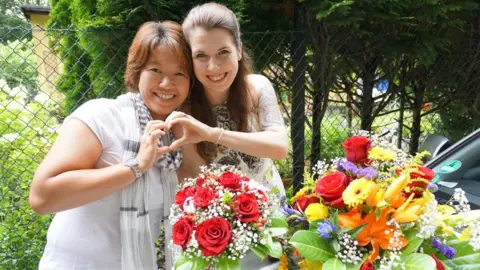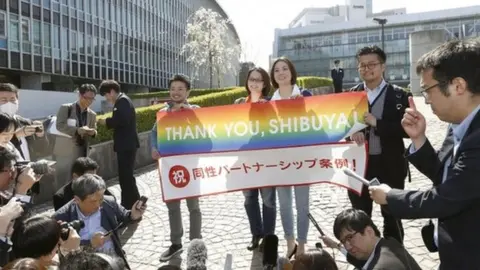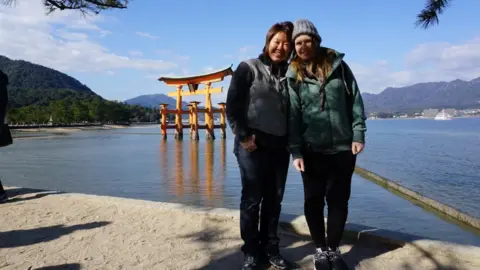Gay couples sue Japan over right to get married
 Ai Nakajima
Ai NakajimaThirteen same-sex couples across Japan are taking legal action on Thursday against the government, demanding the right to get married.
They are suing for symbolic damages, arguing that being barred from marriage violates their constitutional rights.
Should the courts agree, it would mean same-sex unions will have to be permitted in future.
While Japan does not allow gay marriage, surveys suggest there is strong support for the case.
'A very conservative society'
The 13 couples will all file their case on Valentine's Day, in different Japanese cities.
Ai Nakajima, 40, from Japan, and 31-year old German Tina Baumann are among them.
The two have been together since 2011 when they met in Berlin. After living a few years in Germany, they moved to Japan. But living as a same-sex couple was very different in the two countries.
"Japanese society is by nature very conservative," Ms Nakajima told the BBC.
Many of their friends don't dare to out themselves as homosexual and hide their partners from families and even friends.
Though Japan is a very traditional country, polls indicate that the vast majority of younger Japanese support same-sex marriage.
Since 2015, some cities have issued certificates for same-sex couples, but they are not legally binding and merely call on businesses to accord equal treatment.
"So while among younger people there is an overwhelming support for gay marriage, politicians tend to be older and are very hesitant when it comes to changing things," Ms Nakajima says.
The 13 couples know their court cases will draw public attention to their struggle, of course - but there is genuine hope that they might be successful.
"We are prepared to take this to the supreme court," Ms Nakajima explains. "If we have to take that route, it might take more than five years."
 Reuters
ReutersGerman marriage rejected
Ms Nakajima and Ms Baumann got married in Germany, and soon afterwards applied for that marriage to be recognised in Yokohama where they currently live.
As they had expected, the German marriage was not recognised.
For the two of them, this creates concrete problems - Ms Baumann is currently studying, but once she graduates will require a new visa to be allowed to stay in the country.
For a married couple such a visa would easily be issued to a spouse - but that's not the case for same-sex partnerships.
The problems don't stop there though, the two women explain.
"In Germany it's a lot easier to come out and just live the way you choose to as an individual," Ms Baumann says.
"In Japan however, gender roles are a lot more traditional and a woman is expected to marry and have children. In many cases, it's even still expected that a woman will stop working once she becomes a mother."
 Ai Nakajima
Ai NakajimaMany of their friends don't dare to talk openly to their families for fear of becoming outcasts.
"It's almost like you're being banished," Ms Nakajima says. "And it affects many aspects of your life. If you for instance want to rent a house as a same-sex couple, you might be rejected because of this. Or you might not be able to take out a loan as couple if you want to buy a property together."
"It's really like in almost every situation that we are facing problems," she says.
"We have received some criticism from the public that we should just move to Germany rather than make trouble here in Japan," the German says.
Yet in the end, they decided that standing up for what they believe in was more important.
A long road - but a hopeful one
Japan's constitution says that "marriage shall be only with the mutual consent of both sexes" and authorities have always read this as not permitting same-sex marriage.
But lawyers for the 13 couples argue that the text of the constitution was meant to prevent forced marriages, and there's nothing in it that explicitly prohibits gay marriage.
Thursday's lawsuit will likely be only the first step in a long process, but activists have made clear they are prepared to fight long-term for same-sex couples to get married in Japan.
Reporting by the BBC's Andreas Illmer
